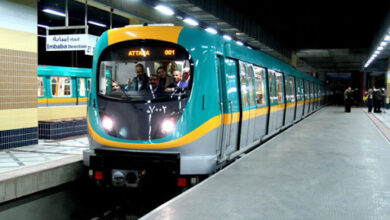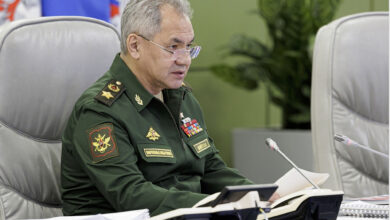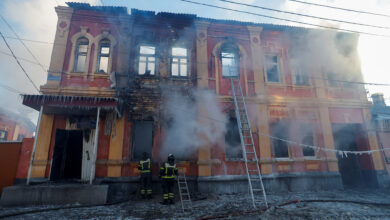The right to strike is clearly stipulated in Egypt’s labor law, but can Egyptian workers really exercise this right? Two recent incidents indicate this right is exercisable in theory or law (de jure) but not in practice (de facto): a bus workers’ strike – which was thwarted by the police, and the ongoing strike at the Tanta Flax and Oils Company – which is not recognized by the state-controlled General Union for Textile Workers.
On Wednesday a general strike planned by some 48,000 workers at the Public Transport Authority (PTA) – including bus drivers, fare-collectors, engineers, mechanics and maintenance personnel – was aborted due to pressures and threats from security apparatuses. Strikes are prohibited, by virtue of a Prime Ministerial Decree complementing the Labor Law, “in strategic and vital sites” including public transportation, amongst a host of others.
One driver, whose name is being withheld for security reasons, told Al-Masry Al-Youm “we had planned to launch our strikes, in all 19 garages across Cairo and Giza, at six in the morning. However, upon arrival we found a multitude of state security officers and plain-clothed agents awaiting us in each of our respective garages. In fact they’re still there right now.” The bus driver added that workers at his respective garage were strictly warned not to strike, and were threatened with immediate arrest if they did not start working.
Several bus drivers, from the Nasr and Fath Garages in Nasr City, were reportedly detained on Wednesday and released shortly after. A one hour strike in the Gesr el-Suez Garage was also reported to have taken place on Thursday. Neither of these reports has been officially confirmed, however. The spokesperson at the Public Transport Authority could not be reached for clarifications.
PTA workers have repeatedly expressed their grievances regarding the deterioration of buses, the lack of spare-parts, insufficient health insurance policies, and traffic fines which are directly deducted from drivers’ wages. These workers have also demanded an increase in their food allowances, while drivers and fare-collectors have demanded medical compensations due to their daily exposure to contagious illnesses. Leading elements amongst these workers have even demanded the establishment of an independent general union for public bus workers in place of their existing union, which is controlled by the state and the Governorates of Cairo and Giza.
Following a two-day strike, 18-19 August 2009, the PTA partially conceded to the workers’ demands (in December) by raising food allowances from LE 100 to LE 120 per month. Another bus driver said “all we have received from the Authority is a monthly increase of LE 20 to our food allowance.” He added “on Wednesday Salah Farag (President of the PTA) promised to address all our remaining grievances, but that’s the same thing he said last August. Have a look around any of our garages and you’ll see for yourself that these are not garages but scrap-yards.”
This driver added “we’ve lost all trust in the Authority’s officials, and we never had any trust for their union. This is why will continue to work towards the establishment our own independent general union, God willing.” This worker admitted that he was influenced by the example of the Real Estate Tax Authority employees who managed, last year, to establish Egypt’s first independent trade union since 1957.
Meanwhile in the Nile Delta some 850 workers at the privatized Tanta Flax and Oils Company have been on strike since 9 January. These workers had launched a five month strike from 31 May – 10 November, with the authorization of the General Union for Textile Workers. This earlier strike was the first to be authorized by the General Union since 1957, and is only the second strike to be authorized in the history of the state-controlled Egyptian Trade Union Federation.
Said el-Gohary, a member of the ruling National Democratic Party and President of the General Union for Textile workers, told Al-Masry Al-Youm “this most recent strike has not been authorized, and is in fact not a strike but a lock-out on the part of the administration. The administration has shut the companies’ gates and has kept raw materials from reaching the production lines.”
El-Gohary added that the company administration had done so in protest against the president of the local union-committee, Salah Mossalam, who refused to go despite being sacked on 6 January. “The sacking of a union-committee member is an illegal and illegitimate action which violates the provisions of domestic law and international labor standards. We are against such punitive measures, and we have relayed our objections to the Ministry of Manpower. Only the general union may dismiss a union-committee member from his post.”
In the town of Mit Hebeish, outside the company’s gates, Salah Mossalam told Al-Masry Al-Youm “just yesterday (27 January) a Tanta Court issued its verdict in my favor. My dismissal has been ruled illegal, and within 15 days I will receive official documents to this effect. But will the administration actually reinstate me? That’s another question.” Mossalam expressed his doubts, especially given that six other sacked co-workers who were issued similar verdicts have not been reinstated. A total of ten workers, including three union-committee members, have been sacked for striking since 2008. The company’s administration has refused to recognize these court verdicts, or has appealed against them.
ِ
Another sacked unionist, Hisham al-Oqal, said “the courts, the General Union, the Egyptian Trade Union Federation, and the Ministry of Manpower have demanded our reinstatement, but our company administration simply ignores them all. We called off our last strike, which lasted more than five months, after having received pledges from the general union, the federation, and the ministry that the administration would heed our demands. In the end the administration only paid us our 7 % pay raise – which was overdue anyway.”
Al-Oqal added that the workers’ three principle demands: a 30% pay raise for 2008, a LE28 increase in monthly food allowance, a 10% annual pay raise, and the reinstatement of nine sacked workers (now ten) have not been met. He added that “since 100% of the company’s shares have been privatized and sold” to Saudi Investor Abdelellah el-Kaaki, “we are unable to call for its re-nationalization, and we can’t resort to workers’ self-management since his administration is still around. Such actions would be considered illegal.”
El-Gohary confirmed “re-nationalization is out of the question. The administration may either reoperate this company or liquidate it, in the end it is up to the investor to decide. We don’t know what will become of this company, since the investor refuses to engage in dialogue with us.”
Frustrated with their conditions, the Tanta Flax workers clashed on Sunday with riot police who moved in to seal-off the companies’ gates. One worker and a senior police officer were wounded in the clashes. On Monday an attempt to march to the headquarters of the Gharbiya Governorate was thwarted by by riot police, in response the workers briefly blocked-off the Tanta-Zifta Highway. On Tuesday the workers managed to march to the governorate and a delegation presented a list of grievances to the governor.
“We sent a bouquet of flowers to the injured senior officer along with a greeting card," said Mossalam.




